Related Research Articles
Rabbi Adin Even-Israel Steinsaltz was an Israeli Chabad Chasidic rabbi, teacher, philosopher, social critic, author, translator and publisher.
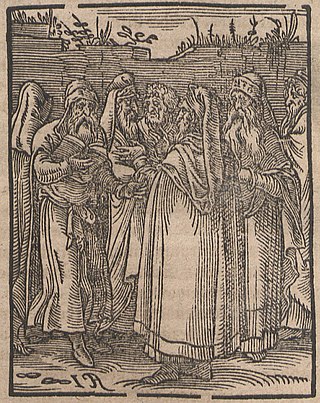
Kabbalah is an esoteric method, discipline and school of thought in Jewish mysticism. A traditional Kabbalist is called a Mekubbal. The definition of Kabbalah varies according to the tradition and aims of those following it, from its origin in medieval Judaism to its later adaptations in Western esotericism. Jewish Kabbalah is a set of esoteric teachings meant to explain the relationship between the unchanging, eternal God—the mysterious Ein Sof —and the mortal, finite universe. It forms the foundation of mystical religious interpretations within Judaism.
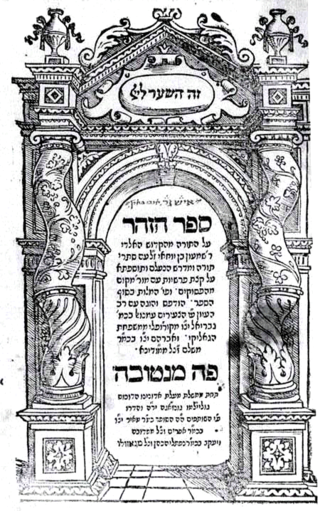
The Zohar is a foundational work in the literature of Jewish mystical thought known as Kabbalah originally written in Aramaic. It is a group of books including commentary on the mystical aspects of the Torah and scriptural interpretations as well as material on mysticism, mythical cosmogony, and mystical psychology. The Zohar contains discussions of the nature of God, the origin and structure of the universe, the nature of souls, redemption, the relationship of Ego to Darkness and "true self" to "The Light of God".
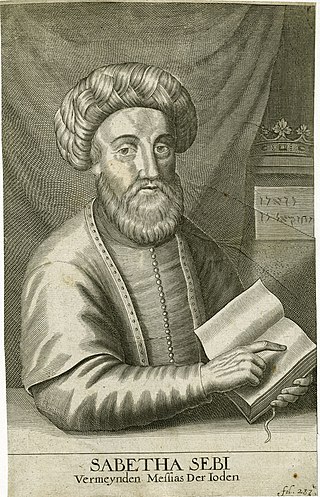
The Sabbateans were a variety of Jewish followers, disciples, and believers in Sabbatai Zevi (1626–1676), a Sephardic Jewish rabbi and Kabbalist who was proclaimed to be the Jewish Messiah in 1666 by Nathan of Gaza.
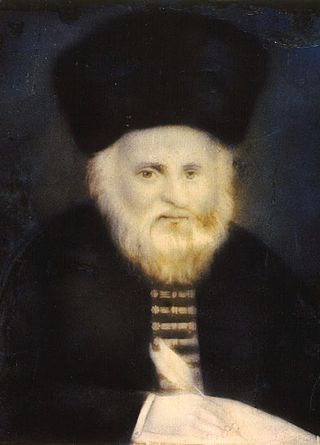
Elijah ben Solomon Zalman, known as the Vilna Gaon or Elijah of Vilna, or by his Hebrew acronym Gra, was a Lithuanian Jewish Talmudist, halakhist, kabbalist, and the foremost leader of misnagdic (non-hasidic) Jewry of the past few centuries. He is commonly referred to in Hebrew as ha-Gaon he-Chasid mi-Vilna, "the pious genius from Vilnius".

Merkabah or Merkavahmysticism is a school of early Jewish mysticism, c. 100 BCE – 1000 CE, centered on visions such as those found in the Book of Ezekiel chapter 1, or in the hekhalot literature, concerning stories of ascents to the heavenly palaces and the Throne of God. The main corpus of the merkabah literature was composed in the period 200–700 CE, although later references to the Chariot tradition can also be found in the literature of the Chassidei Ashkenaz in the Middle Ages. A major text in this tradition is the Maaseh Merkabah.

Gershom Scholem, was a German-born Israeli philosopher and historian. Widely regarded as the founder of modern academic study of the Kabbalah, Scholem was appointed the first professor of Jewish mysticism at Hebrew University of Jerusalem.

Moses ben Jacob Cordovero was a central figure in the historical development of Kabbalah, leader of a mystical school in 16th-century Safed, Ottoman Syria. He is known by the acronym the Ramak.
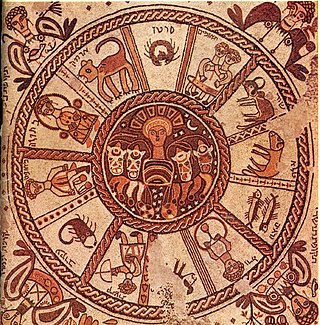
Astrology has been a topic of debate among Jews for over 2000 years. While not a Jewish practice or teaching as such, astrology made its way into Jewish thought, as can be seen in the many references to it in the Talmud. Astrological statements became accepted and worthy of debate and discussion by Torah scholars. Opinions varied: some rabbis rejected the validity of astrology; others accepted its validity but forbid practicing it; still others thought its practice to be meaningful and permitted. In modern times, as science has rejected the validity of astrology, many Jewish thinkers have similarly rejected it; though some continue to defend the pro-astrology views that were common among pre-modern Jews.

Chokmah is the Biblical Hebrew word rendered as "wisdom" in English Bible versions.

Jewish meditation includes practices of settling the mind, introspection, visualization, emotional insight, contemplation of divine names, or concentration on philosophical, ethical or mystical ideas. Meditation may accompany unstructured, personal Jewish prayer, may be part of structured Jewish services, or may be separate from prayer practices. Jewish mystics have viewed meditation as leading to devekut. Hebrew terms for meditation include hitbodedut or hitbonenut/hisbonenus ("contemplation").
Pardes (פרד"ס) is a Kabbalistic theory of Biblical exegesis first advanced by Moses de León. The term, sometimes also rendered PaRDeS, is an Hebrew abbreviation formed from the initials of the following four approaches:
The primary texts of Kabbalah were allegedly once part of an ongoing oral tradition. The written texts are obscure and difficult for readers who are unfamiliar with Jewish spirituality which assumes extensive knowledge of the Tanakh, Midrash and halakha.
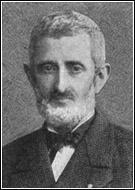
Elijah Benamozegh, sometimes Elia or Eliyahu, was an Italian Sephardic Orthodox rabbi and renowned Jewish Kabbalist, highly respected in his day as one of Italy's most eminent Jewish scholars. He served for half a century as rabbi of the important Jewish community of Livorno, where the "Piazza Benamozegh" now commemorates his name and distinction. His major work is Israel and Humanity (1863), which was translated into English by Dr. Mordechai Luria in 1995.
Practical Kabbalah in historical Judaism, is a branch of the Jewish mystical tradition that concerns the use of magic. It was considered permitted white magic by its practitioners, reserved for the elite, who could separate its spiritual source from Qliphoth realms of evil if performed under circumstances that were holy (Q-D-Š) and pure, tumah and taharah. The concern of overstepping Judaism's strong prohibitions of impure magic ensured it remained a minor tradition in Jewish history. Its teachings include the use of Divine and angelic names for amulets and incantations.
Illui is a young Talmudic prodigy. The Hebrew term is applied to exceptional Talmudic scholars among Jews.

Sifrei Kodesh, commonly referred to as sefarim, or in its singular form, sefer, are books of Jewish religious literature and are viewed by religious Jews as sacred. These are generally works of Torah literature, i.e. Tanakh and all works that expound on it, including the Mishnah, Midrash, Talmud, and all works of halakha, Musar, Hasidism, Kabbalah, or machshavah. Historically, sifrei kodesh were generally written in Hebrew with some in Judeo-Aramaic or Arabic, although in recent years, thousands of titles in other languages, most notably English, were published. An alternative spelling for 'sefarim' is seforim.
Sefer HaTemunah is a 13–14th century kabbalistic text. It is quoted in many sources on Halakha.
Jonathan Garb is an Israeli scholar of Kabbalah. He is holder of the Gershom Scholem chair in Kabbalah in the Department of Jewish Thought at the Hebrew University of Jerusalem.
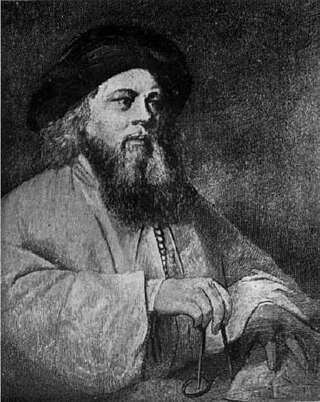
A Baal Shem was a historical Jewish practitioner of Practical Kabbalah and supposed miracle worker. Employing the names of God, angels, Satan and other spirits, Baalei Shem are claimed to heal, enact miracles, perform exorcisms, treat various health issues, curb epidemics, protect people from disaster due to fire, robbery or the evil eye, foresee the future, decipher dreams, and bless those who sought his powers.
References
- ↑ "Bloomsbury - Harry Freedman - Harry Freedman". www.bloomsbury.com. Archived from the original on 2015-02-25.
- ↑ Freedman, Harry, July- (2021). Leonard Cohen : the Mystical Roots of Genius. London. ISBN 978-1-4729-8730-3. OCLC 1243352373.
{{cite book}}: CS1 maint: location missing publisher (link) CS1 maint: multiple names: authors list (link) - ↑ Kirby, David (24 November 2021). "How Spirituality Shaped Leonard Cohen". Washington Post .
- ↑ "The holder of a doctorate in Aramaic translation of the Torah, Freedman deploys his knowledge of midrash with ingenuity, using the techniques of rabbinic interpretation to connect Hebrew sources with material in the Gospels. While his speculations rest on scholarship, he wears it lightly, leading the reader in an easy style to his conclusions about the Grail."
- ↑ Freedman, Harry (2009-03-18). "How to get a job in a recession". BBC News. Retrieved 2009-03-31.
- ↑ "Workers fear for jobs in recession". Metro. 2009-02-23. Retrieved 2009-03-04.